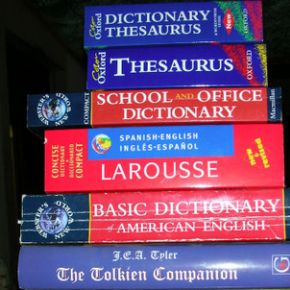 I think I’ve been a very lucky child for a lot of good reasons.
I think I’ve been a very lucky child for a lot of good reasons.
One of these reasons, the one I want to talk about in this post, is that I attended my first English lesson when I was in primary school. They were afternoon lessons, and they were not free, but we are talking about a small village in southern Italy in the first eighties. It meant a lot for me, something very unusual for those times.
I don’t know how much I really learned (I can almost hear your jokes, “by judging the way you wrote this post, full of blunders and all, you learned anything…), I don’t know how effective were those afternoons spent playing, singing English songs and listening English stories with other children, but I can say I really enjoyed them.
“Ladies and gentlemen, welcome to the show” was the first line in a funny “end of year” show, and I can still remember it very well. I had three or four lines in all, but anyway, I was a child that in case of need could invite ome English speaking guests to a show. I knew how to do it.
And I keep on studying at secondary school, with the tape cassette who was a must for our generation (tarattatta -tattata, taratatattatà – tatà: “listen, and repeat. Peter, pass me the ball! Kick the ball! What’s your name? I am thirteen years old…”)
High school years, for my English competence, were the worst. Lousy teachers, senseless programs of study. The only thing I remember is “The albatross” by Coleridge, but just because the poem has been interpreted by Iron Maiden, as a discovered afterwards (“Day after day, day after day, we stuck, nor breath nor motion”).
I had to recover lost time during the college years, when the only exam really tough was English Composition (with an oral examination too). I passed it at the second try working hard at the Cilta (University Language Center). From that moment on I continued to study without stops, English language mainly, with some flirts with French and Spanish too (never used them, completely forgotten).
Now I don’t study it anymore and that’s a shame, but the life of a daddy is full of shame.
I have to retain that English was very useful for me, to find a job, in the private sector and in the public too (I know it can seem weird, but to get a job in the Public Relation Office of a small village, high above the hills, I had to pass an interview with a English mother tongue).
To tell the truth, I used very little my English in the past for professional reasons, and nowadays I don’t use it at all, but what I want to be clear is that in my humble opinion English language is very important.
But.
But also being able to organize a complex reasoning is important, having a good dictionary, to understand irony. The most powerful people I happen to met had a very poor knowledge in foreign languages, but they were so smart in their job they can hire a native speaker assistant.
That’s because what you really need is to be smart. Without intelligence bilingualism is nothing.
Nonetheless, a lot of people of my age are obsessed by the idea their sons must know the meaning of ” good morning”, and who cares if they have no idea of Italian sequence of tenses or if they can’t count to three. Not to mention those desperate parents who, having spent a lot of money for an expensive babysitter from Australia, find out that their daughter speak with her nanny only by gestures..
Bilingualism is an extraordinary gift that can multiply your talent: if your talent is null, it multiplies nothing.
I did with my daughter what I thought was right: small English books, English cartoons, a very light English course for children.
When she, just three years old, told me: enough with English dad, we’re living in Italy and we speak in Italian, I decided not to insist. She’ll study it when she need it. But zero tolerance with the Italian subjunctive: I want her to use them properly. No excuses.
Teach your children to speak a foreign language, and perhaps one day they’ll be an interpreter. Teach your children to speak properly their own language, and perhaps one day they’ll have an interpreter.


mi dispiace ma stavolta proprio non condivido. O meglio, sono assolutamente d’accordo sul fatto che bisognerebbe innanzitutto saper parlare la propria lingua correttamente. Ma, caro Carmine, resteremo per semnpre la periferia dell’impero se ci rifiutiamo perfino di imparare cio’ che- volenti o nolenti- rappresenta, nel mondo intero, lo strumento di comunicazione tra popoli diversi piu’ utilizzato.
Cara Marta, le lingue straniere bisogna studiarle, come dici tu, volenti o nolenti. Nessun dubbio in merito. Qualche perplessità mi resta sullo studio intenso in età prescolare, sul bilinguismo indotto, insoma. Dopo anni di “a pochi mesi si impara tutto in fretta!” adesso alcuni studiosi di neuroscienze stanno riflettendo sulle conseguenze di un eccessivo stress cognitivo sui più piccoli.